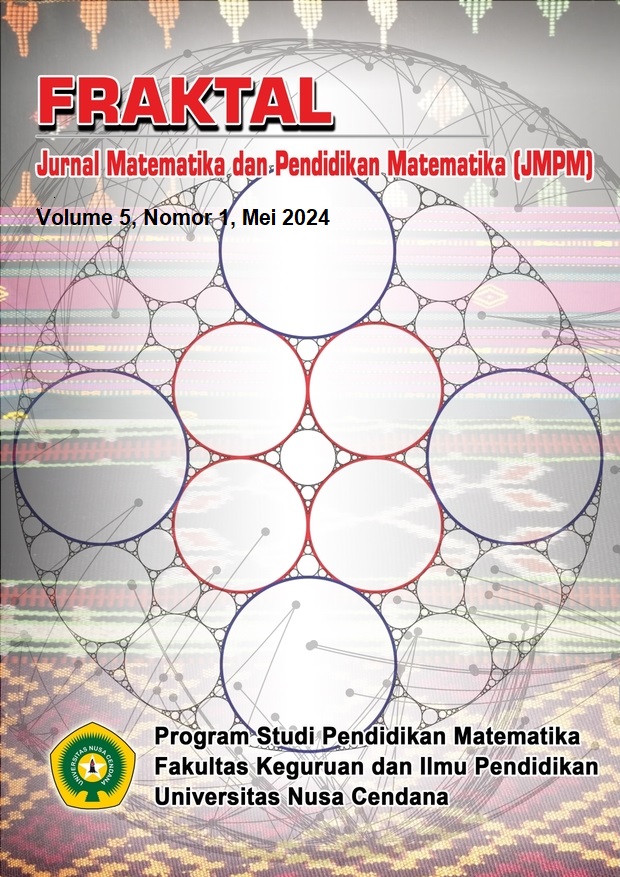Pengaruh Gaya Kognitif Terhadap Hasil Belajar Siswa Pada Mata Pelajaran Matematika
Abstract
Cognitive style is an important factor in the learning process that differentiates between individuals or students in thinking, remembering and behaving cognitively which can influence how individuals absorb and process information. Cognitive styles are classified into two based on psychological differences: Field-independent (FI) and Field-dependent (FD). The aim of this research is to find out how cognitive style on student’s academic performance in mathematics.The approach employed in this research is a descriptive qualitative approach which emphasizes explicit literature review. Based on the studies conducted, this research shows that bothcognitive styles, whether field-independent and field-dependent have a significant influence on the learning process and student academic performance in mathematics subjects. Therefore, the use of appropriate cognitive styles in the learning process can enhance students' mathematics learning outcomes
Downloads
References
Chen, C. (2021). A study on the relationship between reflective-impulsive cognitive styles and oral proficiency of efl learners. Theory and Practice in Language Studies, 11(7), 836–841. https://doi.org/10.17507/tpls.1107.10
Djamaluddin, A., & Wardana. (2019). Belajar Dan Pembelajaran. In CV Kaaffah Learning Center.
Febriyanti, C. (n.d.). PENGARUH BENTUK UMPAN BALIK DAN GAYA KOGNITIF. 3(3), 203–214.
Ikhlas, Al. (2018).Pengaruh model pembelajaran berbasis masalah dan gaya kognitif siswa terhadap hasil belajar matematika siswa di kelas VII SMP Negeri 7 Kerinci. Jambi. Jurnal Ilmiah Ilmu Terapan Universitas Jambi Vol.2, No. 2, 135–143.
K. Brahim, Theresia. 2007. Peningkatan Hasil Belajar Sains Siswa Kelas IVSekolah Dasar, Melalui Pendekatan Pemanfaatan Sumber Daya AlamHayati di Lingkungan Sekitar”. Jurnal pendidikan penabur no 09 tahun ke6 hlmn 4.
Lee, J., & Park, O. C. (2008). Adaptive Instructional Systems. Handbook of Research on Educational Communications and Technology, Third Edition, 1911, 469–484. https://doi.org/10.4324/9780203880869-41
Lusiana, R. (2017). Analisis Kesalahan Mahasiswa Dalam Memecahkan Masalah Pada Materi Himpunan Ditinjau Dari Gaya Kognitif. Jurnal Penelitian Dan Pembelajaran Matematika, 10(1), 24–29. https://doi.org/10.30870/jppm.v10i1.1290
Mailili, W. H. (2018). Deskripsi hasil belajar matematika siswa gaya kognitif field independent dan field dependent. 1(1), 1–7.
Nasution, S. 2008. Berbagai Pendekatan dalam Proses Belajar & Mengajar. Jakarta: PT. Bumi Aksara.
Nawawi. (2015). Penelitian Tindakan Kelas dan Publikasinya. Cilacap: Ihya Media.
O’Brien, T. P., Butler, S. M., & Bernold, L. E. (2001). Group Embedded Figures Test and Academic Achievement in Engineering Education. International Journal of Engineering Education, 17(1), 89–92.
Putra, A., Murti, B., dan Suriyasa, P. (2013). J urnal Magister Kedokteran Keluarga J urnal Magister Kedokteran Keluarga. Jurnal Magister Kedokteran Keluarga, 1(1), 80–91.
Soemantri, S. (2018). Pengaruh Gaya Kognitif Konseptual Tempo terhadap Tingkat kesalahan Siswa. Didaktis: Jurnal Pendidikan Dan Ilmu Pengetahuan, 18(2614–0578), 74–85.
Suryanti, N. (2014). Pengaruh Gaya Kognitif Terhadap Hasil Belajar Akuntansi Keuangan Menengah 1. Jurnal Ilmiah Akuntansi Dan Humanika JINAH, 4(1), 1393–1406.
Ulya, H. (2015). Hubungan Gaya Kognitif Dengan Kemampuan Pemecahan Masalah Matematika Siswa. Jurnal Konseling Gusjigang, 1(2). https://doi.org/10.24176/jkg.v1i2.410
Umaru, Yunusa. 2013. Influence of Reflective and Impulsive Cognitive Styles on Students Achievement in Mathematics among Senior Secondary School Students. Journal Ife PsychologIA. Vol. 21, No. 2. Center for Psychological Studies/Services.
Una, M. 2013. “Hubungan antara Gaya Kognitif Siswa dengan Hasil Belajar Matematika (Suatu Penelitian Survei dengan Pendekatan Korelasional pada Siswa VIII di SMP Negeri 1 Tilong Kabila Tahun Pelajaran 2012-2013)”. Skripsi. Gorontalo:Universitas Negeri Gorontalo.
Witkin, H. A., Moore, C. A., & Goodenough, D. R. (1977). Field dependent and field independent cognitive styles and their educational implications. Review of Educational Research, 47, 1–64.
Wulandari, I. G. A. A., & Agustika, G. N. S. (2018). Pengaruh Gaya Kognitif Terhadap Hasil Belajar Matematika Pada Mahasiswa Semester IV Jurusan PGSD UPP Denpasar Universitas Pendidikan Ganesha Tahun Ajaran 2016/2017. Jurnal Ilmiah Sekolah Dasar, 2(1), 94. https://doi.org/10.23887/jisd.v2i1.15515
Copyright (c) 2024 FRAKTAL: JURNAL MATEMATIKA DAN PENDIDIKAN MATEMATIKA

This work is licensed under a Creative Commons Attribution-NonCommercial-ShareAlike 4.0 International License.
- Hak publikasi atas semua materi naskah jurnal yang diterbitkan/dipublikasikan dalam situs E-Journal Fraktal ini dipegang oleh dewan redaksi dengan sepengetahuan penulis (hak moral tetap milik penulis naskah).
- Ketentuan legal formal untuk akses artikel digital jurnal elektronik ini tunduk pada ketentuan lisensi Creative Commons Attribution-ShareAlike (CC BY-SA), yang berarti Jurnal Fraktal berhak menyimpan, mengalih media/format-kan, mengelola dalam bentuk pangkalan data (database), merawat, dan mempublikasikan artikel tanpa meminta izin dari Penulis selama tetap mencantumkan nama Penulis sebagai pemilik Hak Cipta.
- Naskah yang diterbitkan/dipublikasikan secara cetak dan elektronik bersifat open access untuk tujuan pendidikan, penelitian, dan perpustakaan. Selain tujuan tersebut, dewan redaksi tidak bertanggung jawab atas pelanggaran terhadap hukum hak cipta.

 Susilo Adi Prayoga(1)
Susilo Adi Prayoga(1)










